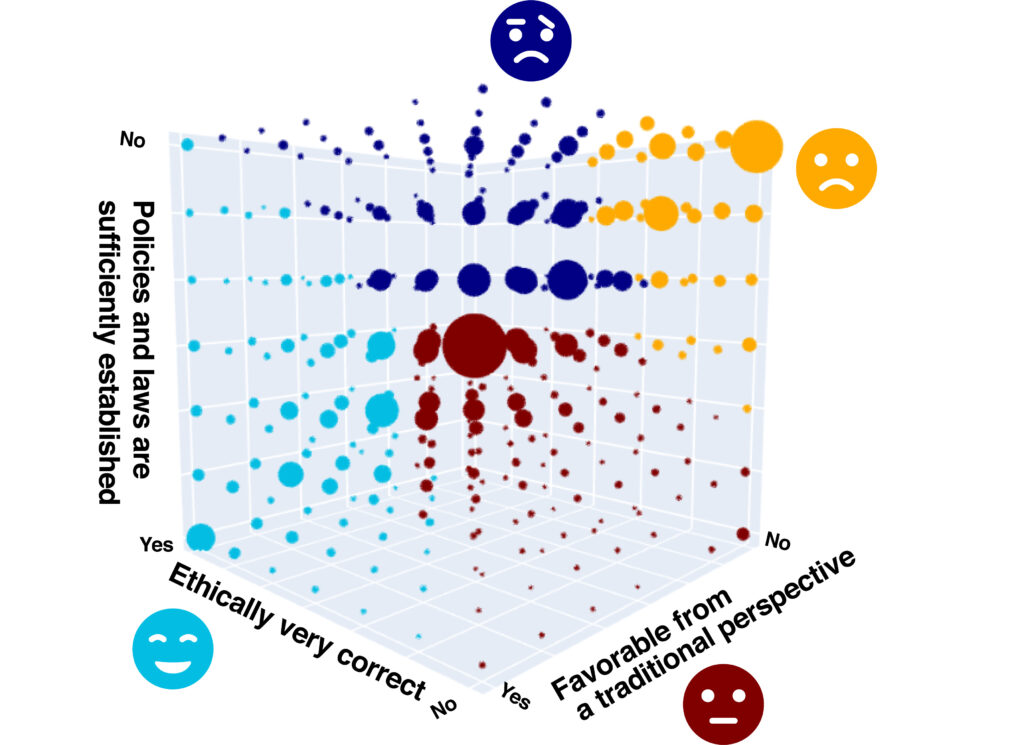Researchers develop a new way to see how people feel about Artificial Intelligence
固定ページ 2022/09/14
Overview of the press release

A research team led by Kavli Institute for the Physics and Mathematics of the Universe (Kavli IPMU) Professor Hiromi Yokoyama, Ikkatai, and University of Tokyo Institute for Physics of Intelligence Assistant Professor Tilman Hartwig, noticed the ethical attitudes towards AI, a universal, advanced technology, varied between countries. The researchers say recognizing public attitudes about AI in different countries will become increasingly important before deploying new AI technologies.
Their study involved carrying out an online survey in Japan, the United States, and Germany, asking respondents to look at four different AI scenarios and answer 3 questions about each of them, taking into consideration the Ethical, Legal, and Social Issues (ELSI). The first scenario involved using AI for AI-generated singers, the second scenario, AI customer purchases, the third, AI autonomous weapons, and lastly AI predictions of criminal activities. About 1000 respondents in each country were chosen, reflecting their own country's population for age, gender and location.
After analyzing their results, the researchers were able to separate responses into four groups: people with optimistic views, people with negative views, people concerned about legal issues, and those not concerned about legal issues. The team have named this the AI and ELSI segment.
Details of their study were published in AI and Ethics on September 1.
Paper details
Journal: AI and Ethics
Journal title: Segmentation of ethics, legal, and social issues (ELSI) related to AI in Japan, the United States, and Germany
Authors: Yuko Ikkatai (1), Tilman Hartwig (2, 3), Naohiro Takanashi (4) , Hiromi M. Yokoyama (3)
Author affiliations:
1 Faculty of Human Sciences, Institute of Human and Social Sciences, Kanazawa University
2 Institute for Physics of Intelligence, The University of Tokyo/Graduate School of Science, The University of Tokyo
3 Kavli Institute for the Physics and Mathematics of the Universe (Kavli-IPMU), The University of Tokyo
4 Executive Management Program Office, The University of Tokyo
DOI:https://doi.org/10.1007/s43681-022-00207-y (published Septenmber 1, 2022)
Paper abstract (AI and Ethics)
https://link.springer.com/article/10.1007/s43681-022-00207-y
Research contact
Hiromi Yokoyama
Professor
Kavli Institute for the Physics and Mathematics of the Universe (Kavli IPMU)
Email: hiromi.yokoyama _at_ ipmu.jp
* Please change _at_ to @
Media Contact
Motoko Kakubayashi
Press officer
Kavli Institute for the Physics and Mathematics of the Universe (Kavli IPMU)
E-mail: press_at_ipmu.jp
TEL: 080-4052-2767
Related links
Measuring Trust in AI
https://www.ipmu.jp/en/20220111-OctagonMeasurement


